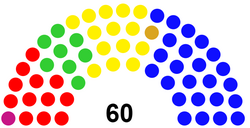Federal Senate (Besmenia): Difference between revisions
Neuleinster (talk | contribs) m (Neuleinster moved page Federal Senate to Federal Senate (Besmenia)) |
Neuleinster (talk | contribs) No edit summary |
||
| Line 167: | Line 167: | ||
| Lower Besmenia || 4 || 2 || - || 2 || - || - ||- | | Lower Besmenia || 4 || 2 || - || 2 || - || - ||- | ||
|- | |- | ||
| | | Gablitz || 4 || 2 || - || - || 2 || - ||- | ||
|- | |- | ||
| [[Sedakania]] || 6 || 6 || - || - || - || - ||- | | [[Sedakania]] || 6 || 6 || - || - || - || - ||- | ||
|- | |- | ||
| [[ | | [[Lemberland]] || 5 || 2 || - || 2 || 1 || - || - | ||
|- | |- | ||
| Summingia || 5 || 3 || 2 || - || - || - || - | | Summingia || 5 || 3 || 2 || - || - || - || - | ||
Revision as of 20:04, 14 August 2021
Besmenian Federal Senate Besmenischer Bundessenat | |
|---|---|
| Type | |
| Type | |
| History | |
| Founded | 2 July 1920 |
| Leadership | |
| Structure | |
 | |
Political groups | (As of June 2021)
|
| Meeting place | |
 | |
The Federal Senate (Besmenian: Bundessenat) is the upper house of the Federal Republic of Besmenia. Through the Federal Senate, the states participate in federal legislation and administration as well as in international affairs. Each state is represented in the Federal Council by members of its state government. In this way, the interests of the federal states are taken into account in the formation of the political will of the state as a whole.
History
Role
Tasks
- Representation of a federal state at the federal level
- Opinion on government drafts
- Participation in foreign affairs
- Right to information the federal government
Composition
The parties that are involved in the state government in the respective state are represented in the Federal Senate. The individual members of the Federal Senate are sent to the Federal Senate by their individual state chambers. The prerequisite is that the members of the Federal Senate must have a seat in their state chambers. The distribution of seats changes after a state election and the subsequent formation of a new government in the respective state.
If a state is represented with 4 seats, if there are two parties in the regional state government, both parties will receive 2 seats. In a state government with three parties, the leading party receives 2 seats, while the other two parties receives one seat.
If there are 5 seats, with a coalition of two parties in the state government, the strongest party receives 3 seats and the second strongest 2 seats. In coalitions with three parties, the first and second strongest party receives 2 seats, while the third strongest receives one seat.
Number of seats
On the occasion of the Besmenian reunification in 1967 the Federal Senate agreed on the following number of seats:
- Each state receives at least four seats
- if there are fewer than five million inhabitants, four seats
- if there are more than five million inhabitants, five seats
- with more than 10 million inhabitants six seats
| State | MPs | BVP | SDU | FBBP | GPB | PBL | NBP |
|---|---|---|---|---|---|---|---|
| Frankenburg | 4 | 2 | 2 | - | - | - | - |
| Greuningia | 5 | 3 | - | 2 | - | - | - |
| Heraldsteinland | 5 | 3 | 2 | - | - | - | - |
| Jakartaburg | 4 | - | 2 | 2 | - | - | - |
| Laitstadt | 5 | - | 3 | 2 | - | - | - |
| Metakumburg | 4 | 2 | - | 2 | - | - | - |
| Lower Besmenia | 4 | 2 | - | 2 | - | - | - |
| Gablitz | 4 | 2 | - | - | 2 | - | - |
| Sedakania | 6 | 6 | - | - | - | - | - |
| Lemberland | 5 | 2 | - | 2 | 1 | - | - |
| Summingia | 5 | 3 | 2 | - | - | - | - |
| Trissia | 5 | - | 2 | - | 2 | 1 | - |
| Zollingia | 4 | 2 | - | - | 2 | - | - |
| Overall | 60 | 27 | 13 | 12 | 7 | 1 | - |
Presidency
The presidency of the Federal Senate rotates among the leaders of the thirdteen state governments in alphabetical order of the federal states. The term of office lasts 2 years. The current president is the Summingian governor Georg Stuck, who took office on October 20, 2019. This ordinance has existed since 1925. Before that, the president was elected by the senate every year according to the number of seats of their group.